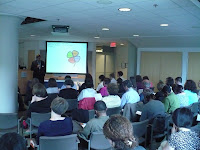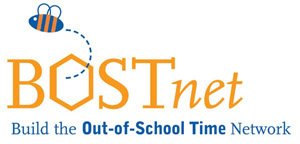 The Quality Forum, held at The Boston Foundation, was attended by over a hundred program staff, directors, administrators, board members, and funders. It is very telling that even with the financial crisis and all the pressure on organizations and their programs that quality matters. Not just doing the job. Beyond just "trying our best," each attendee seemed committed to making their program a quality service for the children and youth it was designed to serve.
The Quality Forum, held at The Boston Foundation, was attended by over a hundred program staff, directors, administrators, board members, and funders. It is very telling that even with the financial crisis and all the pressure on organizations and their programs that quality matters. Not just doing the job. Beyond just "trying our best," each attendee seemed committed to making their program a quality service for the children and youth it was designed to serve.What did this quality look like in the many diverse programs represented at the forum? It is hard to say. Outside of the forum and in many meetings leading up to it, we have heard program directors say they want more information on what children and youth need, what families think about their program, and ways to measure their impact not just for grant requirements, but to answer the questions, "how is my program doing" and "how do I know?" There are a great many program directors feeling stressed by demands for further and more in-depth assessments, reportage, and being held responsible for youth outcomes that they have little direct control over, such as in school attendance or performance. While the definitions of "quality" as a unified front continue to grow (when they do not ebb for lack of funding), staff at the program level continue to do their best to examine their programs and the needs of those they serve.
What was presented at the Quality Forum was not an attempt to promote a unified message around quality, but rather an examination of several views. The view of quality started with research. Dr. Gil Noam, Founder and Director of Program in Education, Afterschool & Resiliency (PEAR) presented a quality view that looked at programs addressing developmental needs of children and youth first and foremost in program design. Young children need different supports than older. The atmosphere of a middle school program needs to be social and active.
 Older youth need to choose activities and need to be motivated to attend rather than compelled or mandated. This work will soon be made more available to a wider audience but for the meantime, it shows that research is supporting the social-emotional power of out-of-school time as a unique environment for youth development.
Older youth need to choose activities and need to be motivated to attend rather than compelled or mandated. This work will soon be made more available to a wider audience but for the meantime, it shows that research is supporting the social-emotional power of out-of-school time as a unique environment for youth development. BOSTnet presented its own research-based framework. This framework looks in depth at the environment and approach of programs. Based on BOSTnet's 21 years of work, this framework is very simple for those who have worked a long time in the field--almost too simple according to the evaluations returned. However, to those who are new to the field or those who continue to not understand the "story of out-of-school" this framework is accessible and demonstrates how the variables of the environment and the approach meet at the point of service to create a quality environment for youth. If this framework appears simple, the mechanics of making it happen are complex and take a great deal of work. The presentation and tools from the 2008 - 2009 field work were disseminated for use by other programs.
Corey Zimmerman, Director of Strategic Planning and Analysis of the Department of early Education and Care (EEC) presented the state's answer to quality through its developing system of quality improvement and program assessment that may be mandated as part of licencing requirements for school-age programs. The Quality Ratings and Improvement System (QRIS), is a "fast-spreading policy innovation because they align standards, supports to programs, and accountability efforts into one non-duplicative system." This effort appears to need a unified system to support it which the out-of-school time field has yet to develop (and often the field asks whether this should ever be developed). This innovation is perhaps useful to staff at programs but also is seen by many in the field as an unfunded mandate since some of the quality improvements don't appear to come attached to additional funding needed for staff time or other expenses. Of course, this is a work in progress, so we cannot point to the nature of the QRIS innovation nor its impact.
The final part of the day was a panel of directors. For Kids Only Afterschool (FKO) and Bird Street Community Center (BSCC) both discussed specific examples of quality in their organizations. For FKO the issue was investment in staff development and an allowance to work with staff at their particular stage in their career and educational growth. This meant a great deal of professional development where their time was paid for. This meant swing time to attend college courses or support to gain a certificate.
 A great deal of training was done internally so that the FKO approach was reinforced and outside trainers brought in for targeted work such as behavior or curriculum development. BSCC also invested in staff. BSCC worked hard to rais funds to increase the number of full time staff so that the positions and the work could be the primary focus of staff and the job as a career was feasible. Staff were supported internally and also provided professional development since now with the extra hours, program staff were paid for these trainings. Both these quality strategies focused on staff. Without good consistent and prepared staff, program quality would suffer. While many in the audience said their organizations could never cover the funding needed to provide such supports, it demonstrated that to achieve quality programming perhaps piecing a workforce together and expecting full time commitment at part time pay is not feasible.
A great deal of training was done internally so that the FKO approach was reinforced and outside trainers brought in for targeted work such as behavior or curriculum development. BSCC also invested in staff. BSCC worked hard to rais funds to increase the number of full time staff so that the positions and the work could be the primary focus of staff and the job as a career was feasible. Staff were supported internally and also provided professional development since now with the extra hours, program staff were paid for these trainings. Both these quality strategies focused on staff. Without good consistent and prepared staff, program quality would suffer. While many in the audience said their organizations could never cover the funding needed to provide such supports, it demonstrated that to achieve quality programming perhaps piecing a workforce together and expecting full time commitment at part time pay is not feasible.In all, the Quality Forum presented a lot of information in too little time. This is also a sign of the times. Programs have reported less time to devote to outside meetings, conferences, even training. It was decided that it was better to fit in too much information - allowing learning points for everyone - rather than a brief survey of information surrounded by ample coffee breaks. Also, as another sign of the time, there was no catering budget.
We welcome further evaluation or response to our Quality Forum. There will be a more formal discussion of this event in the BOSTnet BUZZ, BOSTnet's e-newsletter.




No comments:
Post a Comment